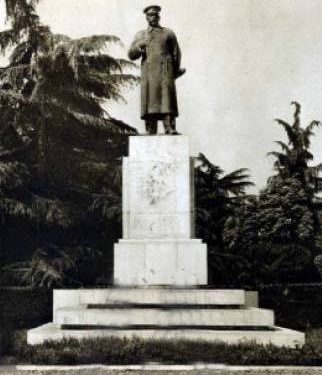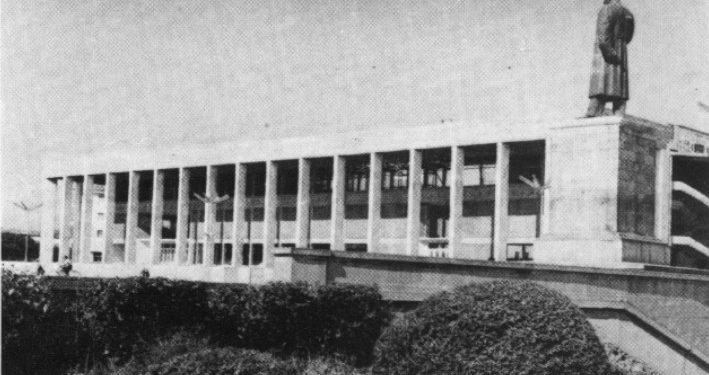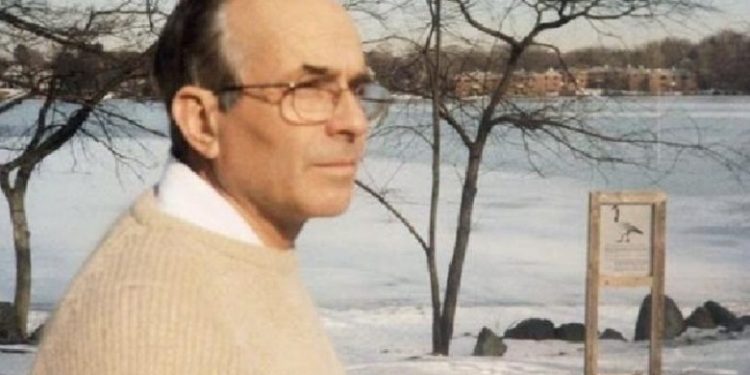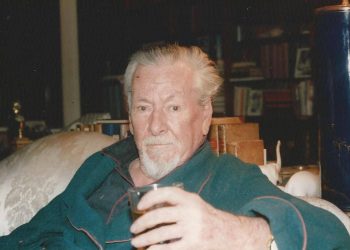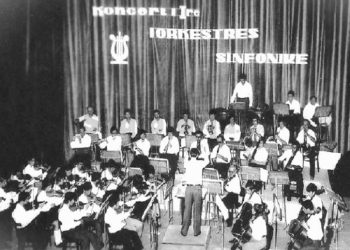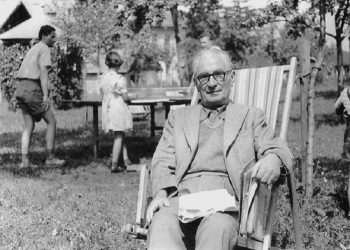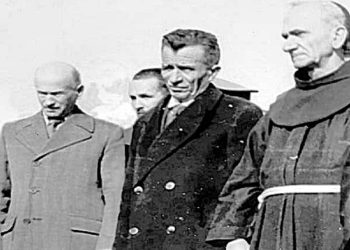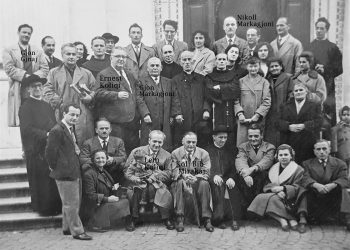By Bashkim Trenova
Part thirty-five
Memorie.al publishes the memoirs of the well-known journalist, publicist, translator, researcher, writer, playwright and diplomat, Bashkim Trenova, who after graduating from the Faculty of History and Philology of the State University of Tirana, in 1966 was appointed a journalist at Radio- Tirana in its Foreign Directorate, where he worked until 1975, when he was appointed journalist and head of the foreign editorial office of the newspaper ‘Zeri i Popullit’, a body of the Central Committee of the ALP. In the years 1984-1990, he served as chairman of the Publishing Branch in the General Directorate of State Archives and after the first free elections in Albania, in March 1991, he was appointed to the newspaper ‘Rilindja Demokratike’, initially as deputy / editor-in-chief and then its editor-in-chief, until 1994, when he was appointed to the Ministry of Foreign Affairs with the position of Press Director and spokesperson of that ministry. In 1997, Trenova was appointed Ambassador of Albania to the Kingdom of Belgium and to the Grand Duchy of Luxembourg. Unknown memories of Mr. Trenova, starting from the war period, his childhood, college years, professional career as a journalist and researcher at Radio Tirana, the newspaper ‘People’s Voice’ and the Central State Archive, where he served until the fall of the communist regime of Enver Hoxha, a period of time when he in different circumstances met many of his colleagues, suckers of some of the ‘reactionary families’, etc., whom he described with a rare skill in a book of memoirs published in 2012, entitled ‘Enemies of the people’ and now brings them to the readers of Memorie.al
Continued from the previous issue
“Enemies of the people”
After the blow I received from Thoma Murzaku, all my friends and colleagues from the Archive left me!
The following months were those of almost complete isolation from peers and colleagues. They dared not come to my office, even for a work problem. They did not dare to accompany me or even invite me for a coffee. My childhood friend, Rinushi, disappeared from circulation, I did not see him and he did not see me anymore, as if we no longer existed, as if we had never known each other. Gjergj Çaprazi once invited me for coffee. Likewise, the deputy director of the institution, Ivan, called me once to have a coffee and once came to my office to exchange two words as friends. On this occasion I told Ivan not to come to me in the office anymore. I did not want him to have consequences. “We have been friends and we will remain friends,” he told me. In fact, not long after, Ivan was removed from the post of deputy director of the State Archives and made ordinary employees.
I thought of myself as a leper. My dear Party had engaged me in this role. Even when we finished work, when we left the State Archive, I myself hurried not to get out of the role; I hurried to cross the other sidewalk so as not to “force” one of my colleagues or friends to make my way to the bus station with me. Actually I was more careful than they were. I did not want friends and colleagues to be seen walking down the street with me, exchanging any words. Thankfully this situation would not last long
Political change in Eastern Europe!
By the end of 1989 some radical changes took place in the communist world. Their consequences were felt in Albania as well. The Soviet Union, the “giant” of communism, could no longer hide the cancerous scars created by the system. It looked like an old ship taking water from all four sides and swallowing it from the depths of the ocean. Gorbachev’s “perestroika” could not save him. In the German Democratic Republic, large popular rallies were organized, which on November 9, 1989 led to the fall of the infamous Berlin Wall, or as it was otherwise called, the “Wall of Shame”. On December 25, 1989, after strong popular revolts, Nicolae Ceausescu, the main leader of the Romanian Communist Party and the Romanian state, nicknamed the “Leader”, the “Carpathian Genius” or the “Danube of Thought”, was executed.
On January 13, 1990, a group of young people from the northern city of Albania, Shkodra, tried to tear down the bust of the Soviet dictator Stalin, located in the center of the city…! This courage cost 50 years in prison to ten young people from Shkodra. This act showed, however, that fear was being killed here in Albania as well. After Shkodra, on March 28, 1990, at 20:30, there was a similar attempt in Tirana. An explosive device was placed near the statue of Stalin on “Dëshmorët e Kombit” Boulevard to blow it up. Communist Albania was Stalinist. Attempts to topple or blow up the bust or statue of Stalin undoubtedly manifested the people’s dissatisfaction with the regime and the desire to overthrow it along with its symbols.
The explosion of the explosive, its powerful noise, was heard by all the inhabitants of the capital. We also heard it in our house. We certainly did not make the connection between the explosion and the statue of Stalin. Only the next morning, in conversations with work colleagues, did I become acquainted with the truth. It so happened that one of one of his friends had died that day. In Albania it is customary that in cases like this, friends and relatives go to the family of the deceased for comfort. We, a group from the State Archives, also left to offer our condolences to the family of a colleague or work colleague. To reach the destination, one had to cross the Boulevard “Dëshmorët e Kombit”, passing the statue of Stalin. As we approached the statue, all curiously jumped at a glance at its feet. Everything was fine. There was no trace, which could testify to last night’s explosion. I, more curious than the others, parted from them and headed to the back of the statue. There were no compromising signs there either. It seemed as if the measures had been taken in time. Fresh flowers were planted. Stalin was calm! The Stalinists of Tirana, certainly not.
After finishing the “inspection” of the back of the statue of Stalin, I made a half arch to return to work. I did not make the visit of consolation. Without leaving more than 50 meters, I see two jeeps parked nearby. I suspected they were State Security. I continued on my way and after a while I turned my head to look at the two “Jeeps” again as if I wanted to make sure if they really belonged to the Security or not. One of them moved in the direction of the statue of Lenin that was at that time on the sidewalk opposite that of Stalin. Then the “Jeep” turned and continued to move in the same direction in which I was moving. I was convinced that the Security was following me. I was not worried. After all I had not done anything that could weigh me down. In “Skënderbeg” square in the center of Tirana, I met Bujar Lako, a friend of mine, one of the most prominent and successful actors of Albanian theater and cinematography. I hugged him. We exchanged a few words and then I continued on my way normally to the State Archives.
Mira and Bujar Lako, to visit our house!
In the evening Mira and Bujar Lako came to visit us at home. I once worked with Mira on Radio Tirana. She was responsible for the music of the shows broadcast by Radio Tirana abroad. Later she passed as a solfeggio teacher in the school “Kongresi i Përmetit”. My wife, Desi, also worked here as a lecturer for the same subject. Mira was married to Bujar Lako. Powerful talent, special acting skills and wisdom helped him in life. I say this because Bujar was also the one with the “stain in the biography”. I do not know exactly why he had this “stain”, but it seems to me from his father. His marriage to Mira, the daughter of a communist family, had not been easy and without worries.
That evening I could not wait to tell Mira and Bujar the story of the jeeps near the statue of Stalin. In fact they too had come to talk about the explosion that had occurred at the feet of the Stalin statue the night before. After I finished telling the story, Bujar told me: “This is only half the story. I will show the continuation “. He told me how, after I had parted with him, the Security Jeep had stopped in front of him. Security people had asked Bujar about me, that is, who I was, how he knew me and others. Bujari had told them my name and surname, adding after two magic words: “Voice of the people”, so as if I worked in this newspaper, a body of the Central Committee of the Labor Party. Actually I had several years since I left there, but the authority of the newspaper and, perhaps, some distant shadow of my name in its pages, have been enough for the Security to believe the words of Generous. I was not registered in the list of criminals returning to the crime scene.
Who planted the explosive at the Stalin monument in Tirana?!
The placement of the explosive in the statue of Stalin in Tirana, according to the official version, was done at an hour when there was a large circulation of people on the Boulevard “Dëshmorët e Kombit”. Under such conditions its perpetrators had been able to carry out the action and leave unidentified mixing with the crowd. The Directorate of Internal Affairs of Tirana, alarmed, urgently took measures to detect them “based on previous materials and reactions against the figure of Stalin.” As it would be said in an information that this Director sent to the First Secretary of the Central Committee of the Party, Ramiz Alia, for this problem, the Directorate of Internal Affairs Tirana, called or identified 247 people from the ranks of those known by her as ” elements in processing ”, identified as hazardous contingent. Documents published years later, in the time of democracy, prove that in the communist dome the event was seen as influenced by recent developments in Eastern Europe, but also as a disagreement with Enver Hoxha’s former assessments of the figure of Stalin.
Even after so many years, I am attracted by the fact that even today, no one, no person or group of people, have been declared or identified as the perpetrators of the placement of the explosive in the statue of Stalin in Tirana. Normally, after the overthrow of communism, the author or authors did not have to remain voluntarily unknown. He, or they, should be proud of their work, the courage shown, and the historic message they conveyed. In order not to prolong it any longer, in short, the silence or even the incomprehensible anonymity, make me suspect that the explosive in the statue of Stalin in Tirana may have been placed by the State Security. Why? Many excuses or conjectures can be made. It may, for example, undertake a campaign of terror. The regime was slipping on its feet.
A few months later, on December 21, 1990, the Stalinist dictatorship would be forced to order the dismantling at night, in secret of the statue of Stalin…! The time of dismantling Stalinism in Albania was approaching. The time was approaching to throw in the history bin the miniature Stalins or the Stalinist matrushkas, who in the name of the people, with violence and terror had usurped their rights in all branches of power, in all spheres of activity of the Albanian society. .
On February 1, 1990, the Professional Unions of the State Archive organized a meeting of the collective to discuss a headline, which was published in “Zëri i Popullit” on the IX Plenum of the Central Committee of the Labor Party with a new emphasis on what was known as the “line of measures”. The party, frightened by developments in the country, was showing itself ready to listen to the “voice of the masses”, which, arrogantly, it had never heard before of life in the country”. She spoke of the “circulation” of the old leadership cadres, thus aiming to leave the popular anger on their shoulders. They were the ones, who were wrong, the Party itself was never wrong!
I cannot say if then I understood that all that was said was demagoguery. I cannot even say that I was aware of this, that I just wanted to take advantage of the moment, to take advantage of the weakness of the moment that probably would not be repeated. I cannot say that I was completely anesthetized with which “Mother Party” had fed me since childhood. However, I took the floor at this meeting and, among other things, spoke about the turnover of the leaders of the institution. For this I asked the “collective by secret ballot to decide, as the most complete expression of democracy”. I invited all the leaders to propose their own turnover, that is, to leave the leading positions, as it were, for a kind of “harakiri”. In the end, I proposed that we meet again the next day to decide concretely, to come up with “final decisions, which will be forwarded, in case we have opinions on changes, to the relevant designation to decide”.
After other employees discussed, the proposals were put to the vote. The collective, by a majority, approved them. The secretary of the organization, Kristaq Teneqexhiu, asked not to hurry, to wait for other orientations from the Politburo. My childhood friend, Rinush Idrizi, did not agree either. For her the meeting and its decisions were not regular, as Thoma Murzaku was not present. Indeed, Thoma Murzaku had been notified of the Trade Unions meeting, but ignored it as he had always done before. The next day, when Thomai was acquainted with the proposals that had been made, he convened the Collegium and there decided that the collective should not meet as it had been decided, on February 2, 1990. Thomai even proposes that at the next meeting, the decisions of the IX Plenum should not be discussed. , but on defense issues in our institution. The bureau of the Party organization agreed to forget the decisions of the IX Plenum only because it suited Thoma Murzaku, only because it would not discuss the framework relations and avoid the possibility of making a decision on its circulation. The collective did not agree and, for the first time, the Party organization did not agree with Thoma Murzaku and the bureau, but joined the opinion of the collective.
The conflict of my childhood friend, Rinush Idrizi, with me and the employees of the operating room?
In the space of these days, Rinush Idrizi arrives at the ‘Exploitation Hall’, as it was then called, the hall where the scholars were acquainted with the documents that were used in their work. My office was very close to the Operating Room. I heard Rinushi’s voice calling and shouting. I left the office and wanted to calm him down. He was addressing our colleagues serving in the Operation Room with the words, “You are mean!” These words were said to them because, according to him, they had not responded in time to the request he had made to consult some documents. I dragged Rinushi to my office and wanted to calm him down, explain to him what the truth was, that there was no negligence or malice from our colleagues. Instead of calming him down, he became even more nervous and addressed me with the words: “You too are a scoundrel. ”You are all the same.” Wow surprised It is not easy to hear such words from a childhood friend. I took him out of the office. After a few days I encountered him on the street. I stopped because I did not want to ruin an old society for a few hasty words. Rinushi refused to talk. “Go away, go away,” he told me. As he treated me like this, he said to our friends in the Archive, Ivan, Eduard and Vehbi: “Unity does not speak to me”!
I have often tried to explain Rinushi’s behavior in very difficult times for me and other employees of the State Archive. In those days I thought his behavior was simply a mistake or, very much, a friendly debt of his to Thoma Murzak. The years spent in the Shengjergj highlands after the IV Plenum of the Central Committee of the Party, destroyed Rinushi. Perhaps the fear of repeating the horror dominated and commanded his behavior! Maybe it was the fear that exploded in nervousness that had turned him into another Rinush from the one I had known, the disobedient, the rebel! In the winter of 1970, while I was continuing my three-month military training in Uznova, Rinushi gave Çlirim Ceka a letter in which he wrote several lines about me. In it he writes: “Baçi! Of course you do not need so few words, but anyway I am sending you with Liberation all the greetings of the hybrid Rinush. If you need anything, tell me. You are fine from home … Hugs…. ”.
The dictatorship probably experimented with Rinushi, turning him into a hybrid being. In fact, she has treated all Albanians like laboratory caviar and has experimented with all of us in the cruelest way. It seems to me that even now, more than two decades after the overthrow of the dictatorship, Albania is still not moving without serious difficulties on the right path to democracy. I think this is also a consequence of the legacy of the “hybrid” man, who created communism by mutilating the normal in man.
The sudden departure of the journalist Astrit Nuri, without finishing the meeting in the Archive?!
The meeting of the collective was finally decided to take place on February 14, 1990 at 17.00. The delegate of the Tirana Party Committee, Nimet Cani, member of the Central Committee, First Secretary of the Party Committee of the Region, came to it. Astrit Nuri, a journalist of “Voice of the People” and my former colleague in this press was also present. I do not know who charged him to be present and, consequently, to write an article in the “Voice of the People” on the discussion of the decisions of the IX Plenum of the Central Committee of the Party in our collective. Astrit did not stay long in the hall. On a break between two sessions, after a phone conversation, he left without saying a word. We realized that the publication in “Zëri i Popullit”, a critical article on many problems in the Central State Archive, would not be done. Someone who had been informed about the “climate” of discussions in this meeting and who guided the “Voice of the People”, had asked for the silent removal of Astrit Nuri from the hall. This is how Thoma Murzaku was once again defended. Unfortunately for him, this would be his last successful defense.
I had prepared 20 typed pages to discuss. In my discussion I emphasized once again the decision of the collective for the circulation of Thoma Murzaku, namely for his removal from the State Archives. Nimet Cani, as it turned out, had come with the intention of forcing the collective to vote for Thoma Murzaku once again. Apparently those who had sent him had thought that his presence would intimidate the employees and cause a second ballot to be in favor of Thoma Murzak. It seems to me that even this single fact showed how far from reality the pashas and the red sultans of the communist dome were, how little they knew about the evolution of the Albanian society. Her thought and courage they had suppressed for decades. These would soon be a thing of the past.
In my small Archive I have also stored information on the collective meeting of February 14 that the Professional Unions of the State Archive have sent to the Central Council of Trade Unions and the Prime Minister. It states, among other things: “The meeting was widely discussed and with a high spirit of partisanship. 27 people discussed…. The work of comrade Thoma Murzaku was widely discussed in the meeting … harsh criticism was made for the display of arrogance, arrogance, revenge…. ”!
On February 16, the decision of the collective is sent to the Council of Ministers, stating: of the decisions of the IX Plenum of the Central Committee, decided unanimously that Comrade Thoma Murzaku, Director of the General Directorate of State Archives, move from his position as head of the institution not only for the fact that he has 11 years in this position, but that in his method and style of work he has manifested pronounced manifestations of bureaucracy in the direction and with his behaviors and attitudes he has severely damaged the framework-mass relations thus losing the respect of the employees. The team also proposes that comrade Thoma Murzaku be left at the disposal of the title, but no longer work as a management staff. We forward to the respective denomination for approval the decision of the collective …. For the Professional Committee Chairman, Dhimitër Dishnica. For the basic organization of the Party, the Secretary, Kristaq Teneqexhiu ”! /Memorie.al
The next issue follows




